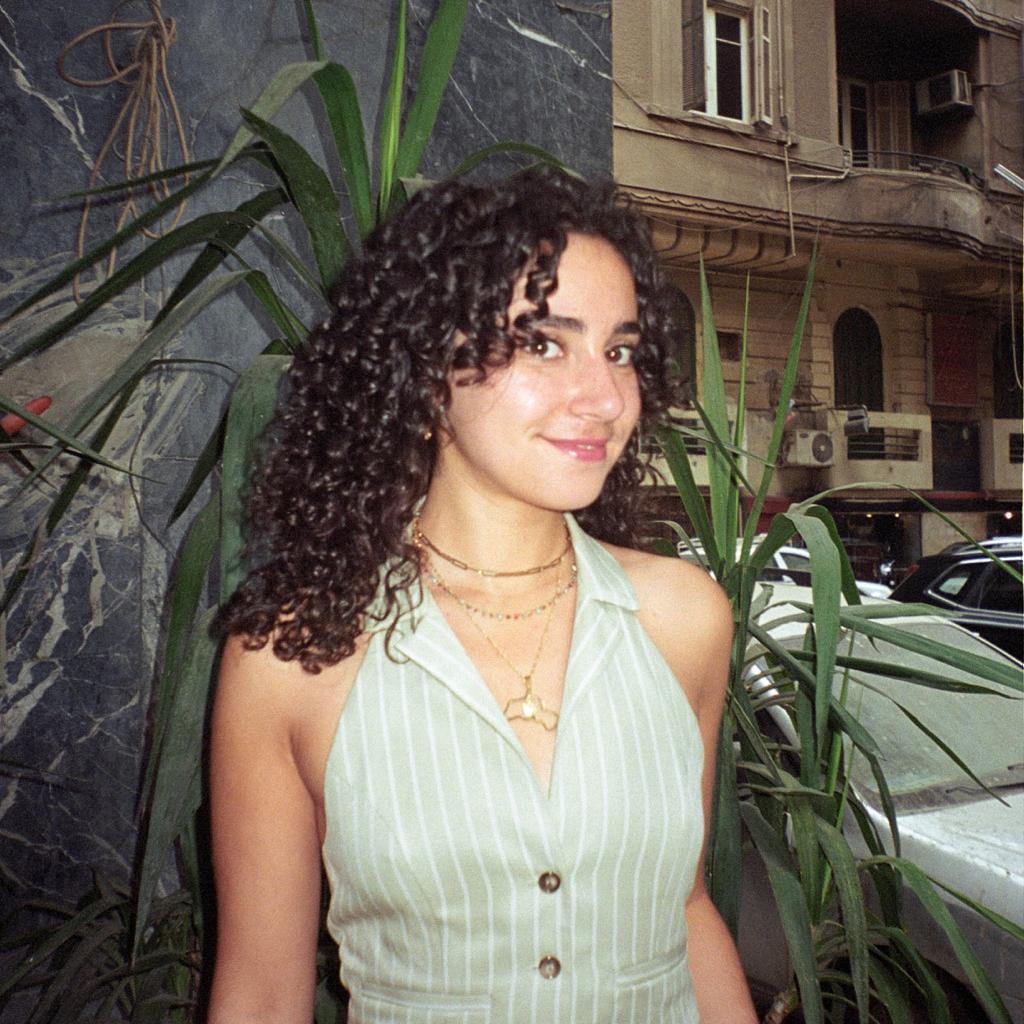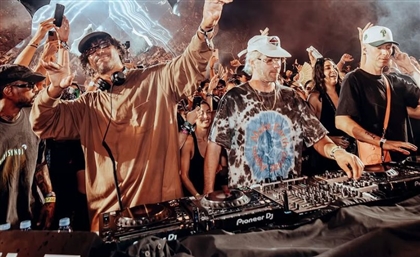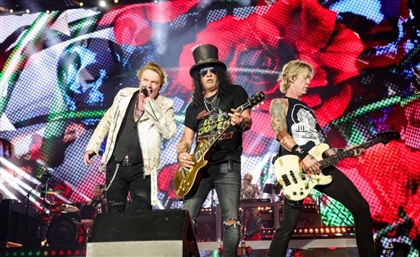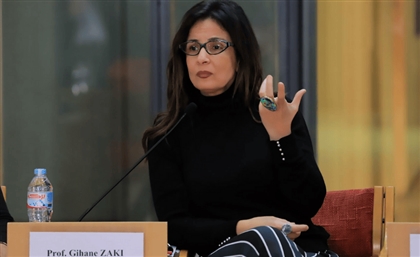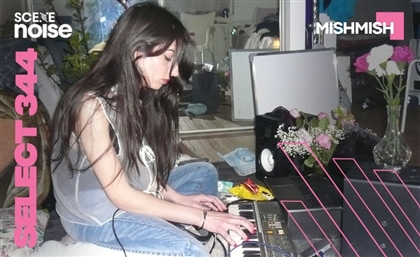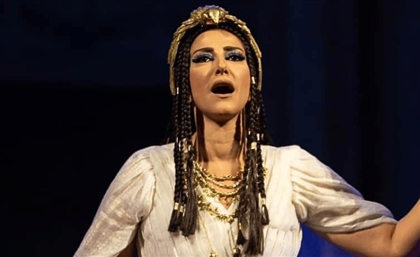Afrojack Leads Workshop in Riyadh to Support Saudi’s Music Producers
This recent collab between MDLBEAST, Merwas & WALL Recordings is an important step in supporting homegrown Saudi Arabian music production.
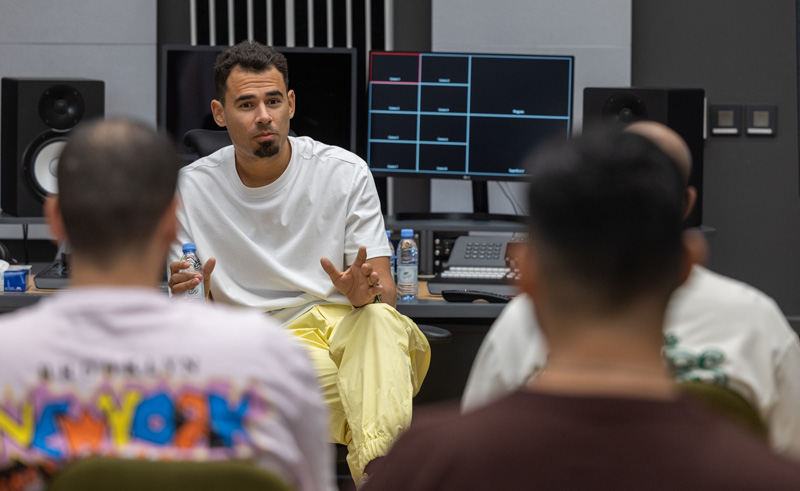
From Riyadh to Jeddah and, most recently, Al Ula, the Saudi Kingdom has become home to new crucibles of sound, ever since Prince Mohammad Bin Salman’s decision to lift the ban on public music events in 2016. We’ve had an eye on the activities of MDLBEAST – an expanding music platform and one of the frontline players in Saudi’s music scene of today – as it propels the beats and melodies of formerly private, underground events into the public sphere. For one, festivals such as Soundstorm and Balad Beast have ushered in international footfall in the hundreds of thousands, whilst music conference XP Music Futures last December gathered industry professionals from all corners of the SWANA regions and its global diaspora.
Stylish events like these are a promising frontispiece to Saudi’s burgeoning music and entertainment industry but prompt questions as to what structural measures are still to be taken in order to buttress the growing industry. Casting an eye over the industry as it stands, a more complete and supportive ecosystem for emerging Saudi music artists will call for more performance venues, more regular enforcement of IP laws, and a wider provision of education to develop musicianship and technical skill. In the interlude between festivities, it’s as much about behind-the-scenes work that will sow the seeds for homegrown sounds of the future.
Upping the tempo with a series of masterclasses on songwriting, artist management and more in the pipeline this year, MDLBEAST and Merwas are proving wide awake to the groundwork needed to support budding talent. Last week, SceneNoise was invited to join the inaugural masterclass to take place in Saudi: a music production course at Merwas Studios in Riyadh, jointly led by MDLBEAST, Merwas and WALL Recordings, the record label of the twice Grammy-winning international DJ and producer Afrojack.
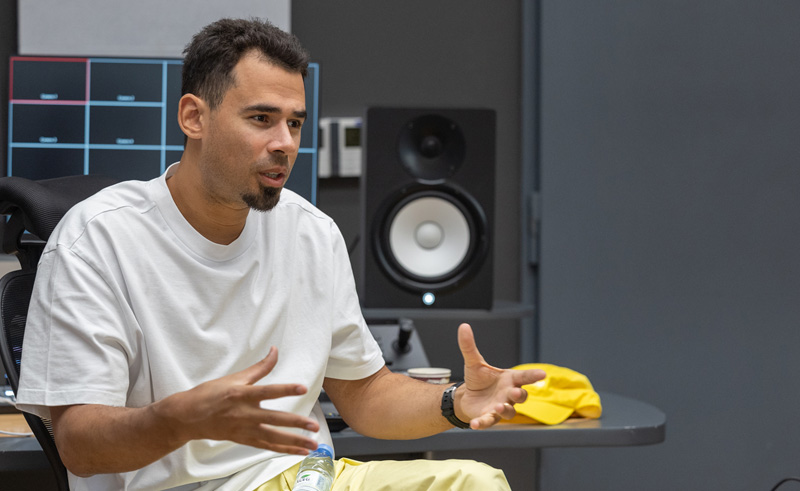 Gathering local music producers whose areas of musical focus spanned techno, deep house, trance, hip-hop, Afropop and more, the five-day camp offered insights from Khaleeji music virtuoso Zaid Nadeem on how to incorporate local Arab cadences and scales into their largely Western repertoires. This comes as valuable information at a time where Western sounds layered with Arab textures and timbres have whet the appetite of global audiences. Meanwhile, Netherlands-based Afrojack lent his tips and tricks on navigating the industry, whilst interactive workshops paired each producer with an expert from WALL Recordings for tailored music advice.
Gathering local music producers whose areas of musical focus spanned techno, deep house, trance, hip-hop, Afropop and more, the five-day camp offered insights from Khaleeji music virtuoso Zaid Nadeem on how to incorporate local Arab cadences and scales into their largely Western repertoires. This comes as valuable information at a time where Western sounds layered with Arab textures and timbres have whet the appetite of global audiences. Meanwhile, Netherlands-based Afrojack lent his tips and tricks on navigating the industry, whilst interactive workshops paired each producer with an expert from WALL Recordings for tailored music advice.
“There’s so much development happening in the region right now and to describe the changes in one word, I’d say: impressive,” shared Rowan Zechiel, Chief Commercial Officer at WALL Recordings. “Nick [van de Wall, a.k.a. Afrojack] sees a lot of potential in the artists here since the music industry’s opened up in the last couple of years… We’re really excited about working with these artists.”
Afrojack has performed twice at MDLBEAST festival since its inception in 2019 and has been invested in artist development both at home in the Netherlands and in Saudi. In 2022, he hosted two camps in Antwerp, Belgium, where the studio facilities of his label WALL Recordings are situated. The course welcomed Saudi producers Cosmicat, Malkin, Dish Dash, and Emad, with the aim of upping their music tech know-how.
In his 2-hour-long masterclass last week, Afrojack shared his tips and tricks to the local producers that involved advice on navigating the industry and moving in tune with what listeners are enjoying. “He gave us a lot to think about… how best to plan my releases, how to approach studio time, how to develop my career as a musician. The business insights were really valuable,” shared one of the course participants: JEME, a DJ, producer and co-founder of KNZ Records.
WALL has a long history of supporting musicians and vocalists on their journey and adding value to their career – take Dutch-Moroccan DJ R3hab for example, whom Afrojack has worked closely with and whose debut album Trouble garnered 500 million streams. However, Zechiel from WALL quickly pointed out that exchanges like this offered clear mutual benefits.
 “The team here lives for sharing our knowledge and experience, hence why we got into contact with MDLBEAST last year. But beyond sharing our knowledge, our goal here is to also explore new areas of sound. Music is like language, and we want to see if we can get Western and Khaleeji tunes to speak the same language, to bring them together,” Zechiel continued.
“The team here lives for sharing our knowledge and experience, hence why we got into contact with MDLBEAST last year. But beyond sharing our knowledge, our goal here is to also explore new areas of sound. Music is like language, and we want to see if we can get Western and Khaleeji tunes to speak the same language, to bring them together,” Zechiel continued.
The towering studio that witnessed this musical tastemaking is Merwas Studios, a solid 5,000 sqm of audio and visual production gear that’s scooped a Guinness World Record for being the largest music production studio in the world. Since its opening last November 2022 it’s welcomed through its doors no other than Busta Rhymes, DJ Khaled, Steve Aoki and – yes – Mike Tyson, as well as ‘Artist of the Arabs’ Mohammed Abdu.
The experience inside reflects something of a spacecraft, clad with 22 recording studios, state-of-the-art recording equipment and adjustable lighting that instils its chiselled white interiors with cobalt-blue fluorescence. From the sounds that faintly carried over when the doors opened into its recording spaces, it’s clear that Merwas is as much a crucible for local Khaleeji sounds as Western ones. Saudi ensembles, orchestras and vocalists poured in and out of the space over the five days I was there.
Founded by Nada Al Tuwaijri and Rumian Al-Rumayyan, Merwas also operates as an Academy, which will undoubtedly play a key role in talent development in the Kingdom in the years to come. “This partnership of Merwas, MDLBEAST and WALL Recordings represents a powerful commitment to and strong investment to help promote the signature sound and distinctive music styles of Saudi Arabia and the region,” commented Nada Altuwaijri, co-founder and CEO.
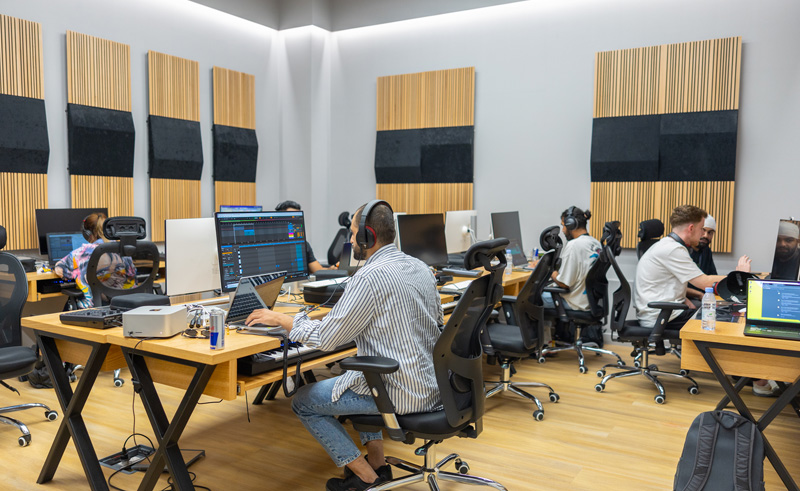 For Lesad, one of the camp attendees, this was her first time in a music studio. “I started off by preparing radio sets at home and uploading them to Soundcloud before eventually playing at festivals like We R Freaks of Nature in Riyadh and then Soundstorm in Riyadh last year,” she shared.
For Lesad, one of the camp attendees, this was her first time in a music studio. “I started off by preparing radio sets at home and uploading them to Soundcloud before eventually playing at festivals like We R Freaks of Nature in Riyadh and then Soundstorm in Riyadh last year,” she shared.
“But this is my first time in an actual studio! Beforehand, there weren’t many opportunities at all to meet and collaborate with other artists like this – let alone to have coaches – so I’m really hyped.”
The second day of the course began with a masterclass led by Zaid Nadeem, Dubai-based Khaleeji music composer with over twenty years of professional experience. Nadeem’s masterclass covered the basics of maqam scales as well as how to find and access Arabic loops, instruments and plug-ins, before running through how different Arabic music elements come together on a track and are quantised in a production software.
Pretty much all of the producers on the course shared that they had been unfamiliar with the technicalities of Khaleeji music, and this represented great headway with lots of new information to take in.
So what are the long-term aspirations for courses like this? “Looking at how Latin beats fused with Reggae and Dancehall to form Reggaeton, we’re wanting to experiment with fusions in any shape or form here,” says Matthew Dicks, Executive Director of Music and Talent at MDLBEAST, “whether that’s electronic fusions, something Amapiano-inspired, techno, garage or a two-step, broken beat.”
To slap together different formats into sexy new subgenres won’t happen overnight, Dicks cautions. “The fusing of Khaleeji sounds with an EDM fall-to-the-floor beat is really hard. As the masterclasses are demonstrating, it’s about taking the influences of each sound and piecing them together. What we want, for now, is just for people to come away from the course with some ideas.”
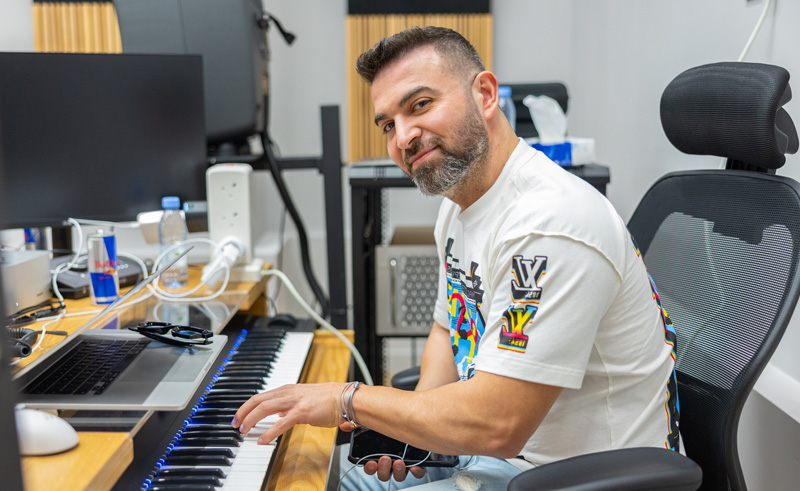
“The splintering of sound into new subgenres is also tricky to pull off here because of the lack of venues and spaces for creative experimentation,” Dicks continues. “Jungle and rave culture in the UK, for example, was born from marginalised Afro-Caribbean communities coming together outside of the mainstream party spaces they were marginalised by in the 90s. Perhaps TikTok and social media might change things – remix and repost culture might help local artists to fall on a signature ‘sound.’”
When asked about the intended audiences for these emerging beats, Dicks explains, “There’s a growing audience around the world for SWANA fusions that we’re tapping into here. We’re inspired by the community that’s expanding through SWANA [South West Asian and North African] parties and networks of party promoters.”
“The thought process we’re having right now is influenced by the trends that are happening around the world, in LA, in Paris, London – we want to embrace these SWANA-inspired beats and bring them back to the region. Speaking from a commercial point of view, the point is that if we want to create a sustainable music industry in Saudi, at this stage, we’re still reliant on the global consumers to join the community here, buy into the locally-produced sounds, develop them, share and sell them.”
There is also the question mark around whether these musical fusions are expected to appeal to local ears? Dicks sheds light, “We do have local spaces like Al Ula that will help to popularise these sounds. But the tunes aren’t necessarily being embraced by the underground party scene here just yet," he adds. "And it’s probably too dance-oriented for mainstream performances. However, as tastes are changing and consumption trends evolve, I believe there will be a growing place for them here.”
Beyond studio time to hone technical expertise, I was also left wondering what more will be done to elaborate a music ecosystem that supports artists.
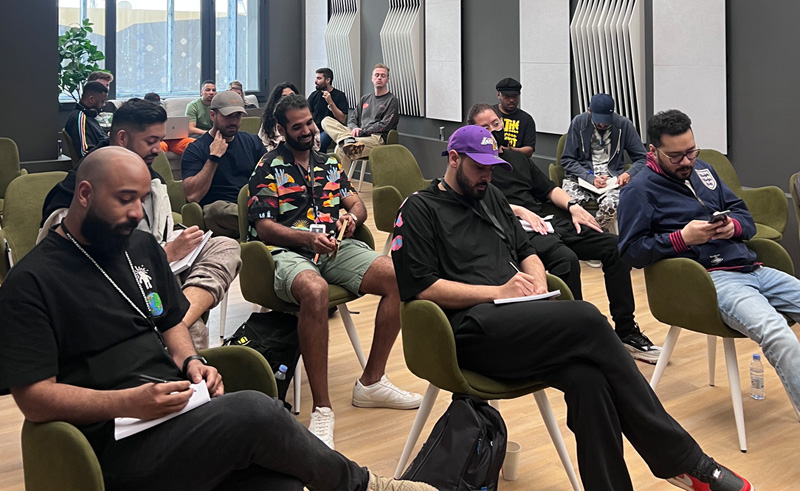 “First things first, artists need more gigs here,” shared Nour Said, A&R and Product Manager at MDLBEAST. “There’s a finite number of gigs, such as Soundstorm and Balad Beast. But we need more small-scale parties of a capacity of 100-200, where up-and-coming artists can invite their friends, mess up, and learn through that process. Venues will be a way for them to meet, learn from and collaborate with other artists.”
“First things first, artists need more gigs here,” shared Nour Said, A&R and Product Manager at MDLBEAST. “There’s a finite number of gigs, such as Soundstorm and Balad Beast. But we need more small-scale parties of a capacity of 100-200, where up-and-coming artists can invite their friends, mess up, and learn through that process. Venues will be a way for them to meet, learn from and collaborate with other artists.”
With changing regulations on public performances in the Kingdom, Ahmad Almomen hopes that more public events can flesh out the mainstream. “There are spaces opening up for performances in Riyadh," he says. "There’s 'The Warehouse' in Jax District, for example, but we need more venues and easily-accessible permits to perform.”
Almomen is managing the planning of five new venues across KSA, overseeing these venues' concept creation and digital infrastructure. “I hope we can get to a place where Saudi’s gigs are globally recognised but still have our local stamp on it. We want people to come from all over to enjoy our music scene.”
- Previous Article HOW (NOT) TO GO TO A PING PONG SHOW
- Next Article Khufu Pyramid in Giza Will Be Closed for Internal Renovations
Trending This Week
-
Jul 15, 2025







